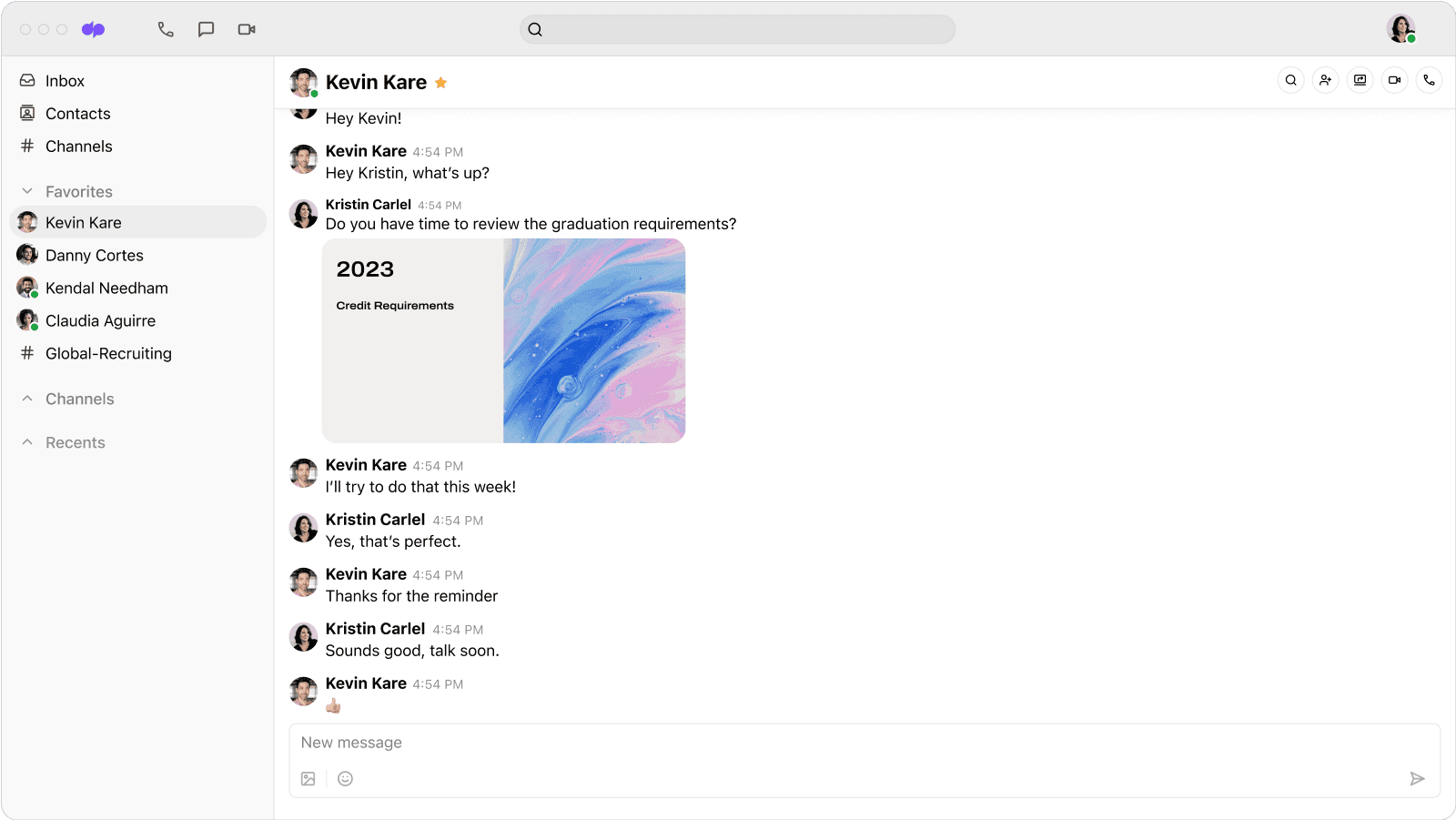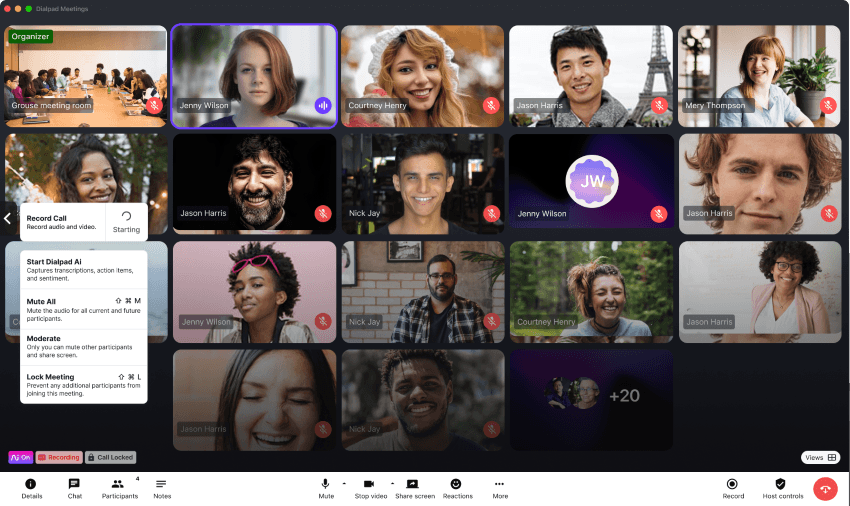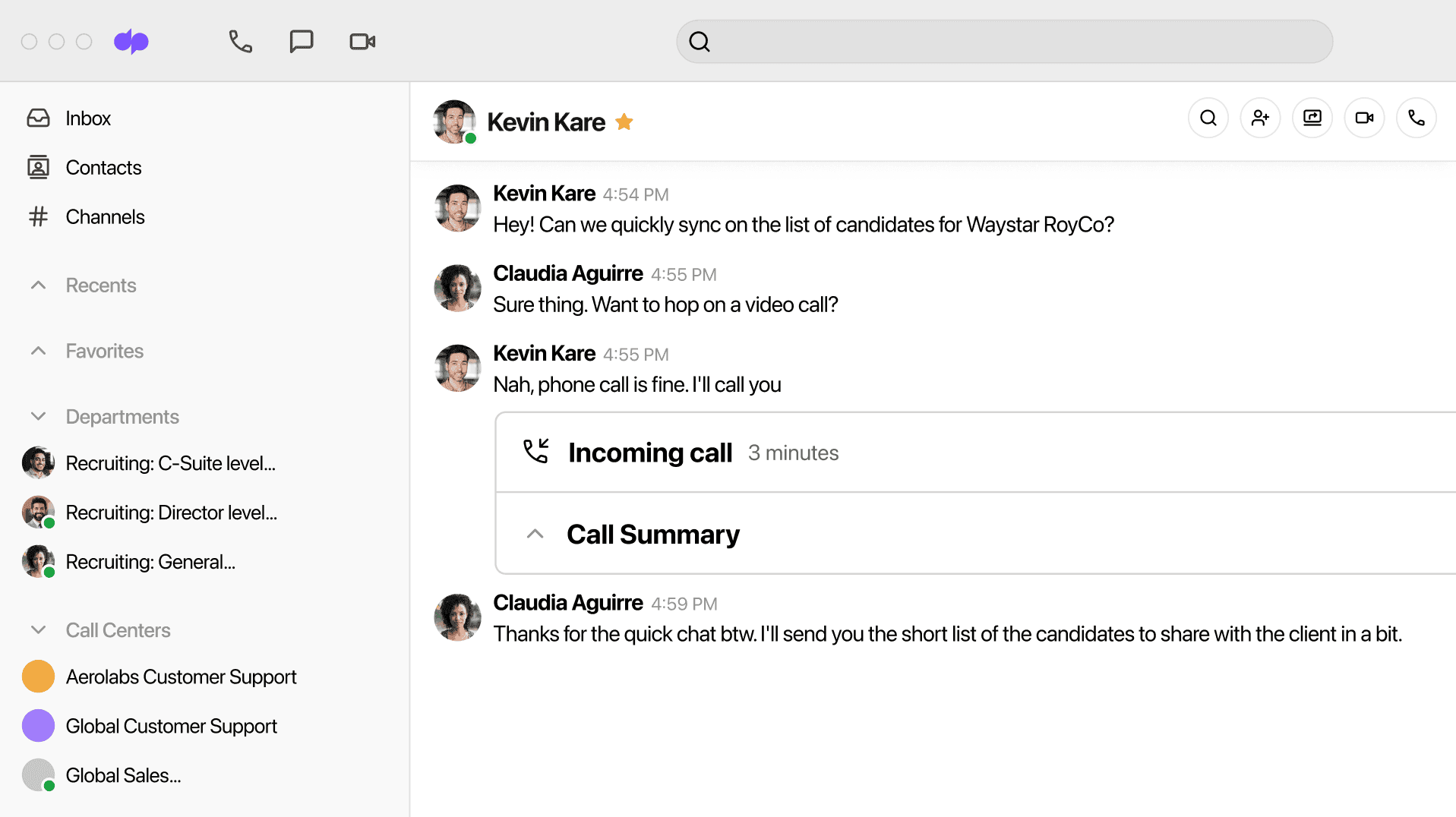The best messaging app for businesses: What to look for and 5 options to choose from

Director of Content

Share
When it comes to messaging apps, there’s a lot to consider, especially if you’re searching for a messaging app for work.
You’ve got to know the app in question works well, supports all your business needs, is easy to use, can be downloaded and used on any device—the list goes on.
So, how can you narrow this down to a few key features to search for, and which providers offer the best apps?
We’ll be exploring the things you should look for right here, plus the five top messaging apps for businesses.
What is a messaging app?
Any app you use to send text or images to others over the internet counts as a messaging app. Most have options for group chats, too, which are text-based channels for three or more people to type and talk in.
Business text messaging, for example, relies on using one of these apps to allow employees to communicate via text:

What should you look for from a business messaging app?
Despite sharing some commonalities with apps developed for personal use, a work messaging app requires certain additional features that make it suitable for professional environments.
Here are the most notable ones:
Scalability
Companies will often experience rapid expansion in a short amount of time. This means business messaging apps need to be able to keep up with this kind of growth—in other words, they need to be scalable.
The easier it is to add new participants to plans, the more scalable a messaging app is.
The best messenger apps should specifically offer options to make business upscaling as simple as possible.
Integrated communications
Messaging is useful on its own, but modern employees generally need other options to communicate with each other (and customers) too.
That’s why what’s better than a business messaging app is a unified communications solution with messaging built-in, just like Dialpad. An app that only offers messaging functionality isn’t suited to organisational use in the same way as a fully integrated comms solution.
Unified communications solutions are also ideal for companies looking to provide omnichannel customer service, as they allow your employees to support customers across all platforms.
Security
While it’s technically possible to handle business messaging using almost any team messaging application, not all of them will properly protect the content of your messages. That’s why a purpose-built business app is vital.
Apps designed with your business needs in mind will come with more robust security measures than chat apps aimed at the general public. This means protection from spam and scams, data encryption, and plenty of other measures to keep your information and messages as safe as possible.
Functionality across devices
Your business messaging app should support all employees, regardless of where they’re located or what equipment they have available.
The best way to ensure this is by making certain your app is fully accessible to anyone with internet access.
Whether they’re using a tablet, mobile device, laptop, or another internet-capable device, they should be able to send business texts and take company calls easily. This helps empower remote workers and keeps everyone connected.
A free trial
It’s tough to say whether you’ll love a new solution if you haven’t had the chance to test it out. This is why you should look for business text and chat apps that come with a free trial period.
As well as buying time to familiarise yourself with this new software, free trials are a pressure-free chance to explore the advantages text messaging apps offer. You may even realise you need a specific functionality you hadn’t previously thought of.
Business-focused design
There’s often a fundamental difference between commercial chat applications and ones designed for business.
The former are focused on connecting individuals and/or small groups, while the latter are built to support larger group conversations. This is one good reason to opt for business-focused messaging platforms.
Even if you’re a smaller company, it’s still important to choose a business phone app. This is because they take your business needs into account and offer functionalities accordingly.
The best app for messaging colleagues and customers: 5 Options to choose from
Next, let’s go through the best messaging apps on the market, showing you what’s great about each of them.
We’ve specifically chosen the number one messaging app for businesses based on the factors outlined above. With our top pick, you get more than just the best chat app—you get a whole business communications platform to go with it:
1. Dialpad: More than just a messaging app
As we mentioned, Dialpad’s features don’t stop at messaging. You get an all-in-one app that lets you voice and video call, text, and more, from anywhere, using any device:

If that sounds like a lot, it’s because it is. Dialpad is a UCaaS (Unified Communications as a Solution) platform, meaning it brings all your business comms together under a single banner. Anytime you want to communicate at work, you can do so with Dialpad.
While some group chat apps might be limited in terms of the systems they can run on, Dialpad is usable on any device that can access the internet. Alongside a mobile and desktop app, it also offers a fully functional browser mode that gives you access to the same functionalities as these applications, meaning you can truly use it from anywhere:

Plus, it comes with lots of features to support you as a business. For example, Dialpad makes it easier to set up A2P messaging, so you can send automated text communications.
From group chats to conference calls, integrations to user-friendliness, Dialpad is one of the most complete and advanced communications solutions on this list.
2. Slack
Another popular messaging platform, Slack had to feature on this list if only because so many people are familiar with it.
Slack comes with a free version that allows you to try out its messaging and file-sharing services, both of which are suitable for businesses.
One thing to note, however, is that it lacks a true phone call feature. While it lets users make VoIP calls to their contacts, cellular calls are not supported. Its free version also fails to include business essentials like video calling.
3. WhatsApp
As one of the most well-known names around, WhatsApp is used by many for their personal messaging needs.
It lets users send texts, photos, and videos and make voice and video calls. It’s also available as an online messaging app, which can be accessed from your laptop.
However, one major point to note about WhatsApp is it’s designed for personal rather than business use. It’s also not a UCaaS solution, meaning it doesn’t offer as many options for business communication as, for example, Dialpad.
4. Facebook Messenger
You’re most likely familiar with this messaging app given how widely used Meta’s products are.
Messenger is built into Facebook itself, meaning anyone with an account can access it. Conversely, anyone who hasn’t signed up for the social media platform can’t use it.
This option is also held back by the fact it relies on users being Facebook friends. For many, this doesn’t feel business appropriate, as they might share personal photos or opinions on their Facebook account that they don’t necessarily want professional contacts to see.
5. Telegram
Built using open source APIs, Telegram is an accessible messaging platform that aims for user-friendliness in its design. This means it doesn’t come with a steep learning curve. It’s also built with security in mind.
However, it’s not as widely embraced as many of these messaging apps—and that means it’s harder to find people to message using it (all end users have to have the app to message on it).
Telegram is also aimed primarily at private parties, meaning it’s not specifically designed for business use.
Chat apps for UK businesses: Messaging isn’t just for friends and family
It’s not enough to rely on the most popular messaging apps in the UK to power your company’s communications—not if you’re looking for the best experience, at any rate.
Instead, what you need is a purpose-built business messaging app that empowers your workforce. That’s what a product like Dialpad offers.
With a unified business comms app that lets you message, text, phone, and host conferences with others from one place, you can bring your entire workforce together. This promotes better teamwork, improved customer communications, and much more.
Which business messaging app will you choose for your company?
Try Dialpad's unified communications platform for free!
Sign up for a 14-day free trial to get phone calls, video meetings, and SMS/MMS + team messaging in a single app. It takes just a few minutes, and you'll be set up with a virtual phone number too. (Or, take a self-guided product tour of the app!)
2. Slack
Of course, we had to include Slack. It’s probably one of the most popular instant messaging apps for businesses. It has a simple user interface that packages messaging and file sharing into a single product, and lots of great automations you can set up too.
(Very few people were probably surprised when a giant like Salesforce bought Slack.)
While the free version of Slack works sufficiently well as a basic instant messaging tool, if you want access to its more advanced features such as group video chat, you do have to opt for one of the paid pricing plans.
The other downside of Slack is that you can’t make phone calls. You can do audio calls with contacts over the Internet, sure, but you can’t dial a call externally.
And if you have plans to grow in the future, or if you have a customer support or sales team that needs features like power diallers or call analytics—you’d have to purchase separate software for all that.
That’s probably the biggest disadvantage of Slack compared to a unified communications platform like Dialpad. You can get a much higher level of consolidation with the latter. That said, it’s still a great tool which is why it's in second here.
3. Microsoft Teams
Another popular tool for internal business communications, Microsoft Teams probably needs no introduction—it has built-in video call and team chat features for collaborating with teams.
Just like Slack, Microsoft Teams doesn’t have telephony that’s affordably available (it does have that functionality, but it was never designed to be a telephony product), and also like Slack, if you need a contact centre platform, you’ll need to pay for a separate tool.
Fun fact: Dialpad does integrate with Microsoft Teams to give you both telephony and contact centre features.
(Alternatively, if your business isn’t married to Microsoft Teams, you could just get all that functionality along with instant messaging software features using Dialpad.)
🤿 Deep dive:
4. Chanty
Another business collaboration tool for teams, Chanty has your usual instant messaging and video call functionality, but what’s unique about it is that it has task management features too.
If you don’t have Asana, Trello, or other task management software, this can come in handy.
It also does have a free plan available for up to 10 users and is quite comparable to Slack, though again, it doesn’t have the unified communications features like phone calls and contact centre.
5. Twist by Doist
Developed by the productivity pioneers at Doist, Twist’s take on the chat app is designed for teams who want an asynchronous style of instant messaging.
For example, they deliberately removed certain chat app features like presence indicators and notification dots to encourage asynchronous communication.
If you just want something for group chats without getting bogged down in chit-chat, this could be a unique solution—but some businesses may not be able to get away with this fully enforced async style.
On the unified communications front, there’s no video calling or audio calling either here, so you’ll need separate tools for that. It also seems like it wouldn’t make sense to have one async communication tool but other synchronous tools because at the end of the day, async probably works best when all your communications are async.
6. Zoho Cliq
Like HubSpot’s very broad suite of tools, Zoho Cliq is part of Zoho’s suite of communication tools (which includes a CRM).
With Zoho Cliq, you get instant messaging, video calls, and file sharing. Price-wise, it’s comparable to Slack and Chanty, though again, you’re paying for a separate communications platform when you could have a more unified solution.
7. Flock
Flock is, yep, you guessed it, another collaboration tool that combines business messaging, video calling, secure file sharing.
To be honest, in terms of pricing, it’s very much comparable to many others on this list like Slack and Chanty, with free plans available.
And the weaknesses are the same as well—no telephony or unified communications.
If you’re happy with just a separate instant messaging app, then for the most part here it just comes down to the details, like which UI you prefer.
8. Troop Messenger
Troop Messenger is a chat app that’s probably not as well known as some of the others on this list, but it markets itself as software that’s for both small businesses and “giant” companies. Again, same story: it has video calls and audio calls in addition to messaging, on an app that works on Mac OS, Windows, iOS, and Android.
What is unique is that Troop Messenger is also available on Linux operating systems.
9. Ryver
Like Chanty, Ryver is a chat app that combines group messaging with task management and basic video chat functionality.
The UI does leave something to be desired though, as it looks a bit outdated, and it’s worth noting that its audio and video calling feature is in beta, which means it’s not quite ready for general use yet.
The pricing is also a different model—instead of paying per user, which is what most of these options have, Ryver charges a set price per package. The Starter plan, for instance, starts at USD 69 per month for 12 users, which may not work for every business.1
10. Brosix
Finally, there’s Brosix, another not-as-well-known instant messaging app for businesses that nonetheless, counts some big companies as its customers (like All State and Xerox).
Again, it checks the boxes for instant messaging, voice calls, and video calls and has the free plan available (only up to three users). No telephony or contact centre, but you do get whiteboarding and co-browsing features, which is somewhat unique.
Ready to improve your business communication with the right instant messaging software?
Whether you’re working at a small business or enterprise organisation, having good instant messaging software that’s designed for business use is super important.
As a rule of thumb, it’s generally best to avoid adding unnecessary bloat to your tech stack and see if you can have a tool that does multiple things well (as opposed to a bunch of one-trick ponies).
If you are in the market for an instant messaging app, why not check out Dialpad’s unified communications platform? It’s easy to use, flexible, and extremely versatile—giving you all the communication channels you need in one place.
Need a communications platform that gives you more than instant messaging?
Sign up for a 14-day free trial to get phone calls, video meetings, and SMS/MMS + team messaging in a single app. It takes just a few minutes, and you'll be set up with a virtual phone number too. Or, take a self-guided interactive tour of the app on your own!
